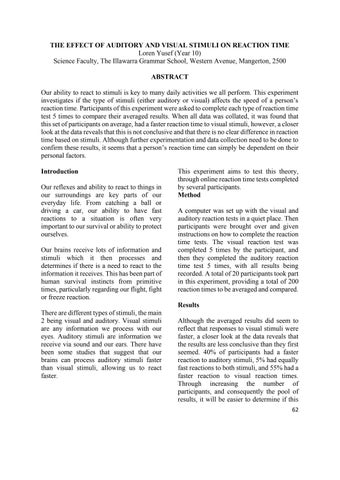THE EFFECT OF AUDITORY AND VISUAL STIMULI ON REACTION TIME Loren Yusef (Year 10) Science Faculty, The Illawarra Grammar School, Western Avenue, Mangerton, 2500 ABSTRACT Our ability to react to stimuli is key to many daily activities we all perform. This experiment investigates if the type of stimuli (either auditory or visual) affects the speed of a person’s reaction time. Participants of this experiment were asked to complete each type of reaction time test 5 times to compare their averaged results. When all data was collated, it was found that this set of participants on average, had a faster reaction time to visual stimuli, however, a closer look at the data reveals that this is not conclusive and that there is no clear difference in reaction time based on stimuli. Although further experimentation and data collection need to be done to confirm these results, it seems that a person’s reaction time can simply be dependent on their personal factors. Introduction Our reflexes and ability to react to things in our surroundings are key parts of our everyday life. From catching a ball or driving a car, our ability to have fast reactions to a situation is often very important to our survival or ability to protect ourselves. Our brains receive lots of information and stimuli which it then processes and determines if there is a need to react to the information it receives. This has been part of human survival instincts from primitive times, particularly regarding our flight, fight or freeze reaction.
This experiment aims to test this theory, through online reaction time tests completed by several participants. Method A computer was set up with the visual and auditory reaction tests in a quiet place. Then participants were brought over and given instructions on how to complete the reaction time tests. The visual reaction test was completed 5 times by the participant, and then they completed the auditory reaction time test 5 times, with all results being recorded. A total of 20 participants took part in this experiment, providing a total of 200 reaction times to be averaged and compared. Results
There are different types of stimuli, the main 2 being visual and auditory. Visual stimuli are any information we process with our eyes. Auditory stimuli are information we receive via sound and our ears. There have been some studies that suggest that our brains can process auditory stimuli faster than visual stimuli, allowing us to react faster.
Although the averaged results did seem to reflect that responses to visual stimuli were faster, a closer look at the data reveals that the results are less conclusive than they first seemed. 40% of participants had a faster reaction to auditory stimuli, 5% had equally fast reactions to both stimuli, and 55% had a faster reaction to visual reaction times. Through increasing the number of participants, and consequently the pool of results, it will be easier to determine if this 62
